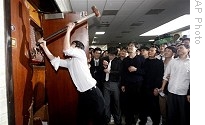-
(单词翻译:双击或拖选)
About 50 members of South Korea's minority Democratic Party forced their way into the main voting hall of the country's parliament Friday and locked themselves in. Their aim was to prevent ruling party members from holding a plenary session that might have resulted in the passing of bills the Democratic party opposes.
South Korean television showed images of police dusting the plenary hall doors for fingerprints3, in hopes of narrowing down which specific Democratic Party members initiated4 the incursion into the hall.
The Democratic Party has 83 seats in South Korea's 298-member parliament. The ruling Grand National Party of South Korean President Lee Myung-bak controls 172 seats and easily outnumbers its opponents. The GNP has promised to pass a number of controversial measures, including a free trade deal with the United States.
 |
| A South Korean opposition5 Democratic Party member with a hammer beats a door to enter into a parliamentary committee room, Seoul, 18 Dec. 2008 |
Last week, clashes broke out as minority lawmakers sought to force their way into a committee room to disrupt the process of ratifying6 the U.S. free trade deal. Security guards opened up fire extinguishers on opponents of the deal as they hammered away at locked and barricaded7 doors. The damaged doors have since been replaced with reinforced steel, in anticipation8 of more physical conflict between the parties.
Democratic Party Chairman Chung Sye-kyun says the National Assembly has turned into a battleground, and he holds the president to blame.
He says the war now taking place in the assembly can be defined as a war initiated by President Lee. He says Mr. Lee is trying to take away the Parliament's role of limiting government power.
Chung and his allies object to several bills they have labeled "evil." The measures would enhance the ability of law enforcement to tap domestic phones, consolidate9 the power of major media companies, and tighten10 rules regarding how citizens post messages online. Democratic lawmakers say the bills put South Korea on a path to the authoritarian11 days of the country's past.
Cho Yoon-seon, spokeswoman for the ruling GNP, says it is the minority Democratic Party that is in the wrong.
She says the DP should stop destroying public facilities, and start participating normally in getting bills passed. She adds, the DP should apologize to the people as they showed contempt for parliamentary process.
It remains12 to be seen whether ruling party politicians will choose to engage in dialogue with opponents, or seek a more muscular approach. There is also a question of whether the conflict will remain contained within parliamentary buildings, or possibly manifest itself in broader public demonstrations13.
 收听单词发音
收听单词发音
1
paralysis

|
|
| n.麻痹(症);瘫痪(症) | |
参考例句: |
|
|
|
2
vowed

|
|
| 起誓,发誓(vow的过去式与过去分词形式) | |
参考例句: |
|
|
|
3
fingerprints

|
|
| n.指纹( fingerprint的名词复数 )v.指纹( fingerprint的第三人称单数 ) | |
参考例句: |
|
|
|
4
initiated

|
|
| n. 创始人 adj. 新加入的 vt. 开始,创始,启蒙,介绍加入 | |
参考例句: |
|
|
|
5
opposition

|
|
| n.反对,敌对 | |
参考例句: |
|
|
|
6
ratifying

|
|
| v.批准,签认(合约等)( ratify的现在分词 ) | |
参考例句: |
|
|
|
7
barricaded

|
|
| 设路障于,以障碍物阻塞( barricade的过去式和过去分词 ); 设路障[防御工事]保卫或固守 | |
参考例句: |
|
|
|
8
anticipation

|
|
| n.预期,预料,期望 | |
参考例句: |
|
|
|
9
consolidate

|
|
| v.使加固,使加强;(把...)联为一体,合并 | |
参考例句: |
|
|
|
10
tighten

|
|
| v.(使)变紧;(使)绷紧 | |
参考例句: |
|
|
|
11
authoritarian

|
|
| n./adj.专制(的),专制主义者,独裁主义者 | |
参考例句: |
|
|
|
12
remains

|
|
| n.剩余物,残留物;遗体,遗迹 | |
参考例句: |
|
|
|
13
demonstrations

|
|
| 证明( demonstration的名词复数 ); 表明; 表达; 游行示威 | |
参考例句: |
|
|
|















